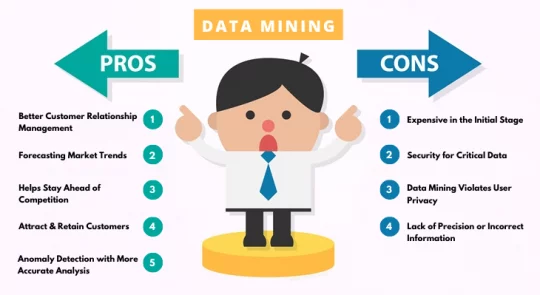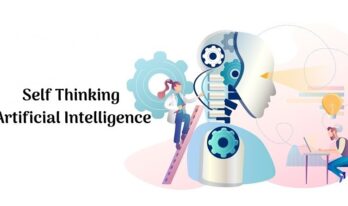Data mining is sorting data according to your needs. It refers to the process of extracting a large number of consistent data patterns, capable of generating valuable insights.
Data mining came about with the intention of helping to understand a huge amount of data. This could then be used to draw conclusions to contribute to the improvement and growth of companies.
The analysis of data through data mining can provide countless advantages to companies for the optimization of their management and time. However, there can also be some inconvenience when using data mining techniques.
Let's take a closer look at these pros and cons of data mining to know if it is worth investing.
Being able to ensure good customer relationship management is one of the key advantages of data mining.
It helps businesses know what type of customers to approach with different kinds of products. This guarantees the sale of the product and not the pitching of the product.
It also helps companies in choosing different marketing strategies depending upon the demography of their customers.
Marketing and retailing depend on the current market trends that are followed by customers.
Data mining allows these industries to find the correct trends through market research which, in turn, helps them in choosing their marketing strategies.
It also allows them to predict trends and products that customers would be interested in. This helps companies decide what type of products to bring into the market.
With so much new data, well analyzed, your R&D department will be at the forefront of trends and will be able to think about the next product.
One strategy that can be used with data mining is to compare the information gathered from your company with that of your main competitors.
With this, you can improve your marketing, develop better products and services and even strengthen your brand.
Data mining offers many advantages over the possibilities of personalization, consistency with the current and future needs of consumers.
Today's consumers crave for a personalized and interactive experience with the companies they engage with.
Thus, the only way to win and retain the customer is to deeply understand their behaviour, characteristics, and preferences.
Data mining enables quick and efficient analysis of the main attributes of consumers. Thus, your advertising campaigns can be targeted exactly to the people who are most likely to become consumers.
The analysis is much more accurate with data mining since it is possible to classify all the information according to the priorities that you previously identified. It is capable of analyzing databases with a huge amount of data.
Data mining can become very useful for various financial institutions. Banks and credit card companies can obtain information on loans and know the creditworthiness of customers.
It also helps credit card companies by providing details about the frauds. These are the most important advantages of data mining as it helps financial institutions reduce their losses.
With a large amount of data getting generated every day, it is pretty much evident that it will draw a lot of expenses associated with its storage as well as maintenance. This is one of the main disadvantages of data mining.
In order to successfully operate data mining, your company needs the appropriate specialists.
Depending on the type of data you want to collect, a lot of work may be required, or sometimes the initial investment to obtain the technologies needed for data collection can be very expensive.
Companies hold a lot of critical information on their customers and employees as well. There’s always a risk of being hacked, as a massive amount of valuable data gets stored in the data mining systems.
Below are the key security issues related to data mining:
-
- Minimal protection setup
- Access controls
- Non-Verified data updation
- Security architect evaluation
- Data anonymization
- Filtering & validating external sources
- Data storage location
- Distributed frameworks for data
Also Read: Data Mining Security Issues You Need to be Aware Of
Data Mining Violates User Privacy
It is comprehended that data mining uses market-based techniques to gather data on people. Most of the time, private information that companies hold is traded to others or leaked.
Organizations gather information on their consumers in several ways to understand their purchasing behaviour and much more.
However, using unethical methods to collect this information and then using it for personal gain violates user privacy.
The data mining tools analyze data without actually knowing its meaning. They present the results in the form of various visualizations. However, these patterns are not meaningful by themselves but only after the user has assessed them.
Pre-processing errors lead to inconclusive or incorrect results. In practice, incorrect data entry often creates problems. Systematic deviations or distortions are further sources of error.
For example, it is impossible to draw representative knowledge from non-representative customer data. Hence, if incorrect information is applied for decision-making, it can cause severe outcomes.
Concluding Words
In times of big data, it is not easy to find data that is, in fact, relevant to your purpose. Therefore, the use of data mining is an excellent way to optimize the process of analysis and use of relevant information.
On the contrary, it also has certain limitations to it as mentioned above. Though the advantages of data mining outweigh the disadvantages, we recommend you to take careful consideration before launching a new data mining project.
You may also like to read:
Top 5 Data Mining Algorithms for Classification
What Are Attributes? Different Database Attributes Types with Examples





